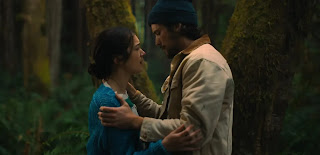

But let's start with some facts about Z-O-M-B-I-E-S. Zombies is a Disney Channel Original Movie series that follows Zed, who is a zombie, and Addison, who is a normal girl with a secret (you'll figure out about that later). Because of a freak accident at a power plant, zombies were created and have been discriminated against ever since. Okay. The first movie is all about ending the prejudice between the zombies and the humans, the second movie is about the reintroduction of the native "monsters" who first inhabited Seabrook and the return of the werewolves. The third movie is about aliens, and them trying to find a new home.
Zombies is a colorful trilogy, and has an okay storyline and a great soundtrack. But you know what's not wrong? The undertones of the stories that the movies tell. Let's think about it:
The first movie details the discrimination. The zombies are segregated from the "normies" and when they first attend human school, have to attend in the basement and there is a big fence at the entrance that seperated them. They live in a seperate part of town that is literally the ghetto, and they rap all the time. In order to keep them from eating brains, they've been neutralized (assimilated) by the Z-bands. People are scared of them because they eat brains and stuff. The first movie obviously represents the discrimination of black people in America, as we were segregated and discriminated against the same as the zombies.
The second movie depicts the discrimination of werewolves. They are the original people that were in Seabrook first, but were chased away by the settlers. Their moonstone was taken by the settlers, and the moonstone fueld Seabrook's wealth for years. Everyone is very scared of the werewolves because they are "vicious beasts". Sound familiar? This is definitely representative of Native American's treatment in America.
The last movie, Zombie 3, was about aliens entering Seabrook. These aliens are from another planet that was destroyed by environmental strife, and these aliens want to find their new home. The aliens enter Seabrook with the intention of finding their new “utopia” (which can easily represent how immigrants enter America searching for the "American Dream"). The aliens are very smart and even more athletic, and possess otherworldly powers. They are mistrusted by the other species as they "take away opportunities from others", with the titular character Zed telling them to go back to their own planet. This movie ties in the stereotypes against immigrants, and ties it in with stereotypes often relegated to Asian people as well.
What's next? LGBTQ vampires, disabled mermaids? But the bigger question is: what is so problematic about this series, and why is it's message of "accepting others who are different from you" not as positive as we think?
First of all, depicting marginalized people as monsters and telling their stories through music and upbeat dancing numbers might just be simplifying the narrative of what these people actually went through. For example, at the beginning of the first movie, integration is currently underway. Zombies are entering the human high school for the first time, and there is a fence at the entrance that seperates the human entrance from the zombie entrance. On the first day of school, people are singing and dancing at the fence (untill things actually get real). This colorful depiction might be interrupted by some casual agression between the normals and the humans, as well as some Zombie patrol brutality (which symbolizes how the police started to find runaway slaves, and neutralize them) but the oversimplification and lack of awareness this movie shows when talking about social issues build and build.
Second of all, the main character, Addison, perpetuates the "White Savior Complex". Not only does Addison seem to identify with every marginalized group, but she tends to deem racism as something you can live and love away (like a true cheerleader). She has white hair, which makes her think that she will never be accepted by the picture-perfect town of Seabrook, and therefore, makes her a victim of opression. Sure, queen. Addison thinks she doesn't belong anywhere because of this white hair and believes that the oppression she faces is similar to the zombies, but she truly isn't "othered" by anyone in any way throughout the trilogy. Addison's character is definitely a problematic point in the series.
Last but not least, the undertones of the story just simply reinforce stereotypes in the real world. Although the movie preaches a message about accepting those who lead different lives than you, monsters are different from minorities in actuality. Zombies are dangerous and eat brains, but are neutralized by the Z-bands. Werewolves are agressive and are considered "savages". Aliens are smart and formidable athletes, and steal opportunities from others in pursuit of their utopia. Everything sends a message, and this is simply the wrong message.
I hope you guys enjoyed this post and were able to maybe take away something from this. If you are interested (or want to), make sure to share this post or follow me (if you have a blog). Sending everyone well wishes!
Ciao,
Miki ✌🏾





Comments
Post a Comment